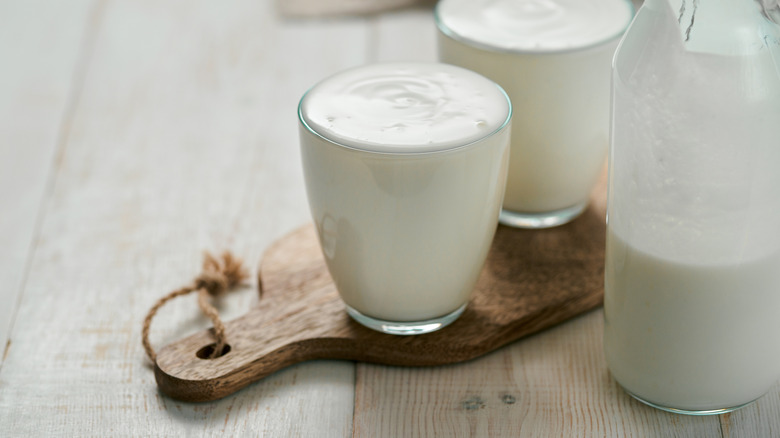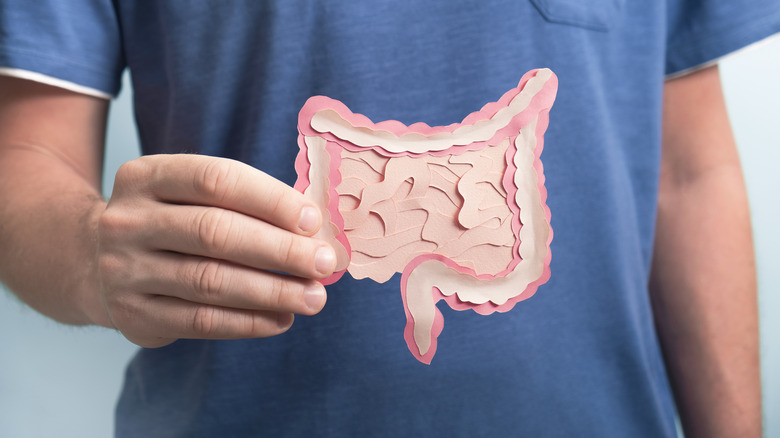When You Eat Fermented Foods Every Day, This Is What Happens
Fermented food has never been more in. With kimchi, sauerkraut, and kombucha taking over our Instagram feeds and our food blogs, fermented food has exploded in popularity, with the market for fermented food products expected to grow by more than $500 million between 2021 and 2026, according to Yahoo! Finance. But although fermentation is the buzzword on everyone's lips, in truth it's one of the oldest forms of food preparation out there. "Fermentation has been a staple of the human foodways for centuries and was initially used as a way to preserve foods," states certified dietitian nutritionist Maya Feller to Eat This, Not That!. From beer to yogurt, pickles to sourdough toast, it's likely you've snacked on something fermented recently, and may not even have known it.
But fermented foods aren't just popular because they taste good. The unique method of preparation for fermented foods often results in powerful nutritional benefits. And here at Health Digest, we wanted to see exactly what happens when you make these foods a daily staple. Join us as we find out.
Your body will be flooded with nutrients
Fermented foods aren't just strong on the flavor front. Nutritionally, these foods offer a serious bang for their buck. Fermented foods, which are frequently made from vegetables, beans, or milk products, are often packed with essential vitamins and minerals that make them a valuable addition to any meal (per Healthline). Kimchi, for example, is a nutritional powerhouse, delivering good amounts of vitamins A, C, and K, folates, choline, beta-carotene, and essential minerals calcium and potassium, says WebMD.
But lots of foods have vitamins and minerals, right? And anyway, can't you just take a multivitamin for that? While that may be true, fermented foods are not just nutrient-rich — they are uniquely capable of assisting our bodies in absorbing all of that goodness, writes nutritionist Kerry Torrens for BBC Good Food. The fermentation process strips away "anti-nutrient" compounds found in certain things like soybeans, which can prevent the nutrients in those foods from being totally available for our bodies to absorb. This means that fermentation allows your system to take on more of the vitamins and minerals it needs to operate correctly from within the food itself.
A daily dose of fermented foods could improve your mental health
The impact of how we eat on our mental health can't be overstated. Eating a diet high in nutritious foods and lower in processed options has been linked to a lower chance of developing depression, according to Medical News Today. What's more, there's a direct link between our gut health and brain, with an unsettled or unhealthy gut potentially contributing to the increased likelihood of experiencing anxiety and stress, says Harvard Health Publishing. All of these things point toward the importance of sustaining a gut-friendly and nutrient-rich diet for our mental health.
And that's where fermented foods come in. Hyper-nutritious and beloved by the gut, fermented foods could help bolster our mental health. Their potential as mental-health-friendly foods has been shown in a review of research published in Nutritional Neuroscience, which discusses the fact that eating fermented products has been seen to have positive effects on anxiety and depression in animal studies. The research does note, however, that further study needs to be done to confirm a similar impact on humans.
Eating fermented food every day may help reduce inflammation
From our knees to our cells, inflammation can occur in our bodies at almost any level, and to any part. Trying to minimize excess inflammation is a key part of keeping our bodies healthy and reducing the risk of developing chronic diseases (per Harvard Health Publishing). That's why it might be useful to know that eating fermented food every day might help to reduce inflammation, according to a study published in Cell.
The study looked at the impact of eating fermented foods over 10 weeks, with one group of participants eating a diet rich in fermented products, and another eating a high-fiber diet. It was found not only that the people eating fermented foods had more gut microbiome diversity, but that their immune cells and inflammatory proteins (that cause inflammation in the body) were also less active and numerous, per Everyday Health. It's proposed that a more balanced gut microbiome limits the growth of certain bacteria that may cause inflammation. While further study is needed, "at the very least this suggests that highly fermented foods should be part of a balanced diet," says C. Scott Mahan, chief of medicine at Charles George VA Medical Center, to Everyday Health (Mahan had no part in the study).
Your gut bacteria will flourish when you eat fermented food
Of all of the reported health benefits of fermented food, one of them is talked about more than pretty much all the others combined: Its effect on your gut. And far from us to buck the trend, we're here to confirm that yes, eating fermented food every day will help boost your good gut bacteria. Fermented foods contain live, friendly bacteria that have a probiotic benefit in your gut, boosting and balancing your microbiome, says nutritionist Kerry Torrens via BBC Good Food. A healthy dose of gut bacteria can keep your digestive system in good health and assist your body in its wider function.
So what are the best fermented foods to eat for a healthy gut? Luckily, you've got a lot of options, folks! Sauerkraut and kimchi, made from vegetables, are packed full of probiotics and fiber, says Eating Well. Yogurt and kefir, both derived from milk, are also great probiotic vehicles, can supply you with an ample dose of calcium, and are also easier on the gut for people who find lactose harder to digest thanks to the probiotics assisting in their breakdown. And if you're looking for a protein, give tempeh a try: Not only will it boost your gut bacteria, but is also jammed full of essential amino acids.
Fermented food may improve your immunity
Are you the type of person who's battling colds left, right, and center every time winter rolls around? If so, we'd recommend giving fermented foods a try. Incorporating fermented foods into your daily diet can have a powerful boosting effect on immunity, thanks to their probiotic effect on your gut, according to Healthline. Having a healthy balance of gut bacteria can affect our immunity significantly, helping to reduce the likelihood of developing infections. This is particularly noticeable with respiratory tract infections (such as colds), with a research review published in Expert Opinion on Biological Therapy demonstrating the link between ingesting probiotics and a lower frequency of sniffles.
And interestingly, if you do get ill, eating fermented foods may reduce the length of time you stay that way. A study published in the British Journal of Nutrition found that eating fermented dairy products containing Lactobacillus lowered the length of time that people experienced common infections. Fermented foods are also generally pretty high in vitamins and minerals, certain types of which (like iron and zinc) are known to maintain your immune system, Healthline says.
Certain types of fermented food may help bolster your bone health
Honestly, we love our bones. And you should too! After all, without them, we'd be little more than puddles on the floor. So we're strong advocates of eating anything that helps boost bone health, including fermented foods, which could be your skeleton's next best friend. Benefits for bone health from fermented foods are particularly clear with milk products like yogurt or soft cheese, according to research published in Calcified Tissue International. Not only do these foods contain the all-important calcium that your bones adore, as well as nutrients like protein and phosphorus which contribute to bone health, but they also can contain prebiotics and probiotics that assist with nutrient absorption.
You don't have to only eat milk-based products to see the benefits for your bones, though. Other fermented foods like kimchi contain calcium and vitamin D, both important in the maintenance of skeletal health (per WebMD). Kimchi also contains a healthy amount of vitamin K, which can help to reduce the risk of brittle bones, and as a bonus, keep your blood clotting healthily.
Eating fermented food every day will raise your sodium levels -- but may not raise your blood pressure
Anyone who's ever taken a bite of sauerkraut or miso will know that many fermented foods aren't exactly sodium-free, and eating fermented foods daily is pretty much a sure-fire way to increase in your sodium intake. Sodium in fermented products is pretty high for a lot of popular choices, with a study published in the Journal of Food Composition and Analysis pointing toward the generally elevated sodium content of Korean soybean pastes, pickled seafood, and pickled vegetables.
And as we're always taught that sodium is the greatest enemy of our blood pressure, this is a bad thing ... right? Well. Not entirely. As a study published in the Asia Pacific Journal of Clinical Nutrition shows, eating fermented vegetable products regularly was not found to equate to higher blood pressure for most people. The researchers proposed that the probiotic effect of these foods could help support underlying mechanisms for keeping blood pressure healthy, thereby reducing the impact of sodium. Hypertension risk was higher for obese men who ate salty fermented vegetables, however.
Fermented foods may improve your digestion
If you have trouble with your digestion, you might want to give fermented foods a try. These tart food products are full to the brim with probiotics, as Healthline says. Probiotics — also known as "good" bacteria — regulate our body's balance of bacteria, reducing the number of bad bacteria floating around in our gut and keeping our systems in good working order (per the Cleveland Clinic). In addition to this, certain strains of good bacteria also assist our body's food breakdown processes, allowing what we eat to move through our systems with greater ease.
These fermented food products can also help those who have digestive conditions like irritable bowel syndrome (or IBS) to reduce the severity of their symptoms. A study published in Alimentary Pharmacology & Therapeutics examined the effects of eating fermented milk products every day for people with IBS. It was found that eating the fermented food reduced the severity of bloating, improved stool frequency, and generally decreased discomfort. Eating foods with probiotics in them may also reduce the frequency and severity of diarrhea, a study in Current Opinion in Gastroenterology found.
Eating fermented food daily may support your heart health
Keeping our hearts healthy is a juggling act. A huge number of factors from our cardio fitness level, family history, weight, resting heart rate, blood pressure, and cholesterol levels all affect our heart health, as the American Heart Association says. And the latter two factors may well be impacted, and improved, by including daily fermented foods in our diet. A meta-analysis published in the British Journal of Nutrition examined the role that fermented foods (specifically fermented milk products) play in regulating blood pressure. The meta-analysis found that overall, fermented foods derived from milk were seen to reduce blood pressure, both for people who already experienced high blood pressure and in pre-hypertensive people.
Cholesterol levels, too, were found to be improved by eating fermented milk products, in a meta-analysis of six studies (via the European Journal of Clinical Nutrition). This was seen to be the case both for total cholesterol levels, and for levels of LDL cholesterol (or "bad" cholesterol). This meta-analysis, however, only included short-term studies and stated that the long-term effects of fermented milk products on cholesterol have yet to be determined.
Your skin health will improve when eating fermented foods every day
What's the secret to glowing, flawless skin? Well, if you don't have a Hollywood stylist on hand to prep your face every morning like you're going to the Met Gala, eating fermented foods regularly may be an easy (and much cheaper) substitute. The nutritious nature of many fermented foods means that they're packed with vitamins and minerals that "are good for your whole body, and that includes your skin," says board-certified dermatologist and McGovern Medical School's clinical professor of dermatology Rajani Katta to the American Academy of Dermatology Association (AAD).
And the beauty of the fermentation process is it helps your body synthesize nutrients, making them more available and useable by your body, according to registered nutritionist Celeste Wilson (per Eat This, Not That!). Some of the vitamins in fermented foods, like biotin, vitamin B12, and folic acid, all contribute to skin and hair health, and their unique bioavailability means that your beauty regimen may benefit big-time. Just be wary of switching up your entire diet based on your skincare alone. "Talk to a board-certified dermatologist first," says Katta (via AAD).
Eating fermented foods will help control blood sugar
Our blood sugar governs a lot in our bodies. As our body's primary energy source, our blood sugar affects how we go about our day-to-day lives, and consistently high blood glucose can incur or contribute to more chronic problems (per MedlinePlus). But introducing fermented foods to your regular diet may help keep your blood sugar under control, according to research published in PLoS One. As the research shows, the probiotic-rich nature of fermented foods helps to boost and balance the gut's healthy bacteria, which then seems to encourage healthy blood sugar levels, although the researchers indicate that exactly how glucose is lowered remains unclear.
Eating fermented foods rich in probiotics also appears to regulate insulin levels. This insulin regulation, along with the lowering of blood sugar, means that fermented foods could be useful as part of a healthy, balanced diet for people with diabetes. A mini-review published in Nutrients confirms that this could be the case, with researchers discussing the fact that consuming fermented food products may not only help with blood sugar control, but can also boost antioxidant levels and reduce inflammation, both useful in diabetes treatment.
Your brain health may be improved by eating fermented foods
In our bodies, everything's linked — and this means that the food we eat can have a direct impact on the brain. The gut-brain connection is a well-established network between our organs, with neurotransmitters pinging between the them via nervous pathways and affecting everything from stress levels to cognitive function, says Healthline.
Our gut bacteria's balance directly affects the health of communication between the gut and brain, and that's where fermented foods, with their rich probiotic status, come in. A diet rich in probiotics encourages a healthy gut-brain connection, and a healthier brain overall. According to research published in Preventive Nutrition and Food Science, multiple studies have shown the "cognitive enhancing effects" of fermented foods, with the probiotics delivered via your kimchi or yogurt helping to regulate neurotransmitter release, which improves balance, memory, and capacity to learn. Fermented foods also make the nutrients within them more available through the fermentation process, essentially meaning that your brain gets more of the good stuff.
Eating fermented food daily may mean you eat less overall
Once you start enjoying the complex, zingy flavors of miso, kombucha, and kimchi, it might be hard to stop. But interestingly, eating fermented foods may mean that you end up eating less of them — or, at least, less food overall. Fermented foods are often high in fiber, as Gutbliss discusses. Consuming more fiber in our diets can make us feel less hungry overall, which then means that we eat less food, says Healthline.
It's not just the fiber-rich fermented foods that might see you consuming fewer calories, however — fermented foods like yogurt that are higher in protein may also do the trick. Research published in the International Journal of Obesity observed that regular yogurt consumption generally resulted in a lower body mass index and lower amounts of weight gain. It's proposed that regularly eating foods high in probiotics allows your gut bacteria to flourish, and a healthier gut microbiome may influence your appetite and could even stop your body from absorbing as many calories from certain foods (per Healthline).
Eating fermented food in large quantities may cause unpleasant side effects
With the seemingly endless number of articles and blog posts proclaiming fermented foods' incomparable benefits to your body, it's pretty clear: They're nothing but good for you. Right? ... Right?
Well, while some fermented foods are among the healthiest things you can incorporate into your diet, we'd be wary of jumping into eating them with too much haste if they're not a staple in your fridge already. "While fermented foods are great for gut health, too much too soon can definitely upset your digestive system," warns Snap Kitchen's lead registered dietitian Sam Presicci to Well+Good. This may be particularly notable if you're eating fermented products that are higher in fiber, like cabbage-based sauerkraut or kimchi. The fiber in these foods can result in bloating and gas, as WebMD states. This may be exacerbated by the probiotics present in the foods, which can also cause digestive concerns (per Healthline). This is why it's good for people to introduce fermented foods to a diet slowly at first, "having less than the recommended serving and working their way up," says Presicci (via Well+Good).















